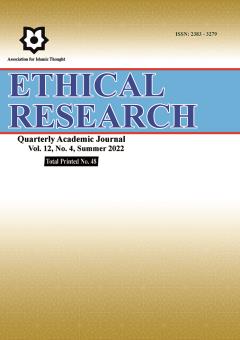Social factors affecting personality development from Rumi's point of view in Masnavi
Subject Areas : Ethics and Islamic Education
Samad Abbaszadeh Gorjan
1
,
Mohammad Farahmand
2
,
Ebrahim Danesh
3
![]() ,
Faramarz Jalalat
4
,
Faramarz Jalalat
4
1 -
2 -
3 - University of Mohaghegh Ardabili
4 -
Keywords: social factors, personality development, Rumi, Masnavi, personality psychology.,
Abstract :
Since Rumi's Masnavi is an educational-mystical work, the poet has tried to express his advice and counsel on social issues in the form of stories, anecdotes and allegories, as well as his mystical thoughts and ideas. Therefore, the stories, anecdotes and allegories of Masnavi are very diverse. This diversity causes the multiplicity and diversity of characters in Masnavi; What is the basis of any story is its characters who are the cause or routine of events. In fact, the fictional world of Masnavi is full of characters that Rumi selects from different social classes and strata and consciously places them in line with his theological, mystical and philosophical thoughts, views and beliefs. Rumi cleverly considers the psycho-class traits of the characters in the world of his stories, and the fictional characters also play their role in proportion to those traits and characteristics. This article examines some of the most important social factors influencing the evolution and characterization of Rumi and the characteristics of the characters in Masnavi stories. The results of this study show that: Rumi in many stories of Masnavi with simple anecdotes and stories and generally taken from the life of the masses to reflective approaches and conclusions in the action and reaction of the character Rumi's interpretive and semantic mind is always looking for spiritual qualities behind the objects and characters of the story and material and tangible matters in order to make the reader and the audience read the colorful meanings that are worthy of the followers of the path.
ابرمز، اچ ام. (1386). فرهنگ اصطلاحات ادبی، ترجمۀ سعید سبزیان، تهران: انتشارات رهنما.
استعلامی، محمد. (1387). متن و شرح مثنوی مولانا، تهران: نشر سخن.
بابازاده، علی¬اکبر. (1374). زمینه¬های فساد در جامعه و راه درمان، قم: انتشارات قدس.
پارسانسب، محمد. (1387). جامعه¬شناسیِ ادبیات فارسی، تهران: انتشارات سمت.
پرین، لارنس. (1378). تأملی دیگر در باب داستان، ترجمۀ محسن سلیمانی، تهران: انتشارات سازمان تبلیغات اسلامی.
زرین-کوب، عبدالحسین. (1366). بحر در کوزه، تهران: انتشارات علمی.
----------------. (1388). سرّ نی، تهران: انتشارات علمی.
زمانی، کریم. (1388). میناگر عشق، تهران: نشر نی.
سانتراک، جان دبلیو. (1383). زمینۀ روان¬شناسی، ترجمۀ مهرداد فیروزبخت، تهران: نشر رسا.
ستوده، هدایت¬الله. (1376). آسیب¬شناسیِ اجتماعی، تهران: انتشارت آوای نور.
سلیم، غلامرضا. (1377). جامعه¬شناسیِ ادبیات، تهران: انتشارات توس.
شاملو، سعید. (1363). مکتب-ها و نظریه¬ها در روان¬شناسی شخصیت، تهران: انتشارات شرکت سهامی چهر.
شفیعی کدکنی، محمدرضا. (1399). صور خیال در شعر فارسی، تهران: نشر نگاه.
فروزانفر، بدیع¬الزمان. (1385). احادیث و قصص مثنوی، تهران: انتشارات امیرکبیر.
مجتهدی نجفی، شمس¬الدین. (بی¬تا). گتار شیعه در اصول و فروع، بی¬نا.
مستور، مصطفی. (1379). مبانی داستان کوتاه، تهران: انتشارات علمی.
مکارم شیرازی، ناصر. (1384). پیام قرآن (تفسیر موضوعی)، تهران: دارالکتب الاسلامیه.
مولوی. (1387). شرح جامع مثنوی معنوی، به کوشش کریم زمانی، تهران: انتشارات اطلاعات.
میرصادقی، جمال. (1379). عناصر داستان، تهران: انتشارات علمی.


